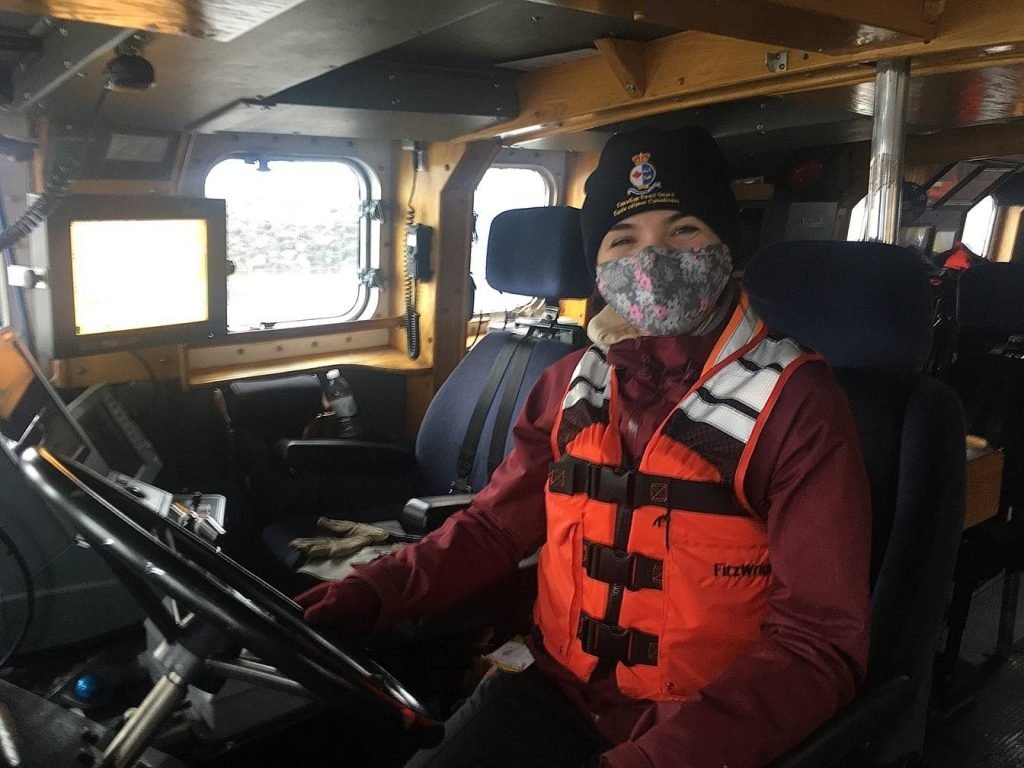Women Making Waves - Manuela Homberger
 Aside from working in the family bakery for 11 years growing up, Manuela’s first job after college was with a private company in the aviation sector called Nav Canada. She was thrilled at scoring a position as an installation technologist and to become the first female tech hired in their Atlantic Engineering Department. Aviation has always been a major interest of hers so working to install new, ground based infrastructure to facilitate the safe and efficient movement of air traffic was a challenging yet rewarding operation. The fieldwork included travelling to local and remote sites and airports in and outside the province. She held that position for about 4.5 years before getting hired on with the Canadian Coast Guard (CCG). Every day at Coast Guard is an adventure as you could be doing anything from bench testing different electronic equipment in the shop, to fixing a CCG vessel or flying via helicopter to a remote site to restore service. In her free time, she enjoys reading, dirt biking and riding my motorcycle. She is first-generation Canadian, and her German parents became new Canadian citizens recently! 1. How did you end up working in or alongside the maritime industry? Please tell us the story of how you got to your current role. I was very fortunate to get hired on with Coast Guard shortly after I was laid off at Nav Canada. A former Nav Canada tech working for Coast Guard reached out and notified me that Coast Guard was looking for an electronics technologist. I applied and got the job. It was only a 90 day casual position at first, however that became a 12 month term and then a permanent placement. 2. What education have you taken a) pre-working in or alongside the maritime industry and b) since joining the maritime industry? My education includes a 2 year diploma in Electronics Engineering Technology that I received from NBCC in Moncton. I have taken several equipment and company related courses provided by my former employer Nav Canada. Since starting with Coast Guard, I have had some introductory training as well as on-the-job mentoring on some maritime communication, navigation and surveillance systems. Additionally, I have upcoming radar training at the Coast Guard college in Sydney, NS. 3. What is the most rewarding thing about working in or alongside this industry? The most rewarding aspect of working in this industry is the spontaneous nature of the work. Promptly responding and resolving equipment outages and service requests for Coast Guard vessels is likely the most fulfilling aspect of the job. 4. Did/do you have any role models in the industry? If so, please tell us about that experience and tips on how to approach someone for mentorship. One of my coworkers at Coast Guard, Andy Briggs has been a great role model for me in this industry. Andy is very approachable and knowledgeable in electronics and beyond and when I first started with coast Guard I was made to feel very welcome. They bring a lot of fun and positive energy to a rather technical environment and anytime I need support Andy has always been happy to help. Being very goal oriented, I am not shy when it comes to asking for direction or some mentorship. Usually, I make light of my situation and ask who I feel is best suited to help me. Keeping in mind chain of command, I may ask any of my coworkers, supervisor, manager or members of other departments when necessary. 5. What is your advice for someone looking to get into this industry in our region? Any important events or associations to be following? Follow companies of interest on social media and LinkedIn. Attend tradeshows, network with people and pursue an education in skills required for the desired job. There are also many resources on various career websites as well as company websites that may provide some guidance as well.
Aside from working in the family bakery for 11 years growing up, Manuela’s first job after college was with a private company in the aviation sector called Nav Canada. She was thrilled at scoring a position as an installation technologist and to become the first female tech hired in their Atlantic Engineering Department. Aviation has always been a major interest of hers so working to install new, ground based infrastructure to facilitate the safe and efficient movement of air traffic was a challenging yet rewarding operation. The fieldwork included travelling to local and remote sites and airports in and outside the province. She held that position for about 4.5 years before getting hired on with the Canadian Coast Guard (CCG). Every day at Coast Guard is an adventure as you could be doing anything from bench testing different electronic equipment in the shop, to fixing a CCG vessel or flying via helicopter to a remote site to restore service. In her free time, she enjoys reading, dirt biking and riding my motorcycle. She is first-generation Canadian, and her German parents became new Canadian citizens recently! 1. How did you end up working in or alongside the maritime industry? Please tell us the story of how you got to your current role. I was very fortunate to get hired on with Coast Guard shortly after I was laid off at Nav Canada. A former Nav Canada tech working for Coast Guard reached out and notified me that Coast Guard was looking for an electronics technologist. I applied and got the job. It was only a 90 day casual position at first, however that became a 12 month term and then a permanent placement. 2. What education have you taken a) pre-working in or alongside the maritime industry and b) since joining the maritime industry? My education includes a 2 year diploma in Electronics Engineering Technology that I received from NBCC in Moncton. I have taken several equipment and company related courses provided by my former employer Nav Canada. Since starting with Coast Guard, I have had some introductory training as well as on-the-job mentoring on some maritime communication, navigation and surveillance systems. Additionally, I have upcoming radar training at the Coast Guard college in Sydney, NS. 3. What is the most rewarding thing about working in or alongside this industry? The most rewarding aspect of working in this industry is the spontaneous nature of the work. Promptly responding and resolving equipment outages and service requests for Coast Guard vessels is likely the most fulfilling aspect of the job. 4. Did/do you have any role models in the industry? If so, please tell us about that experience and tips on how to approach someone for mentorship. One of my coworkers at Coast Guard, Andy Briggs has been a great role model for me in this industry. Andy is very approachable and knowledgeable in electronics and beyond and when I first started with coast Guard I was made to feel very welcome. They bring a lot of fun and positive energy to a rather technical environment and anytime I need support Andy has always been happy to help. Being very goal oriented, I am not shy when it comes to asking for direction or some mentorship. Usually, I make light of my situation and ask who I feel is best suited to help me. Keeping in mind chain of command, I may ask any of my coworkers, supervisor, manager or members of other departments when necessary. 5. What is your advice for someone looking to get into this industry in our region? Any important events or associations to be following? Follow companies of interest on social media and LinkedIn. Attend tradeshows, network with people and pursue an education in skills required for the desired job. There are also many resources on various career websites as well as company websites that may provide some guidance as well.
